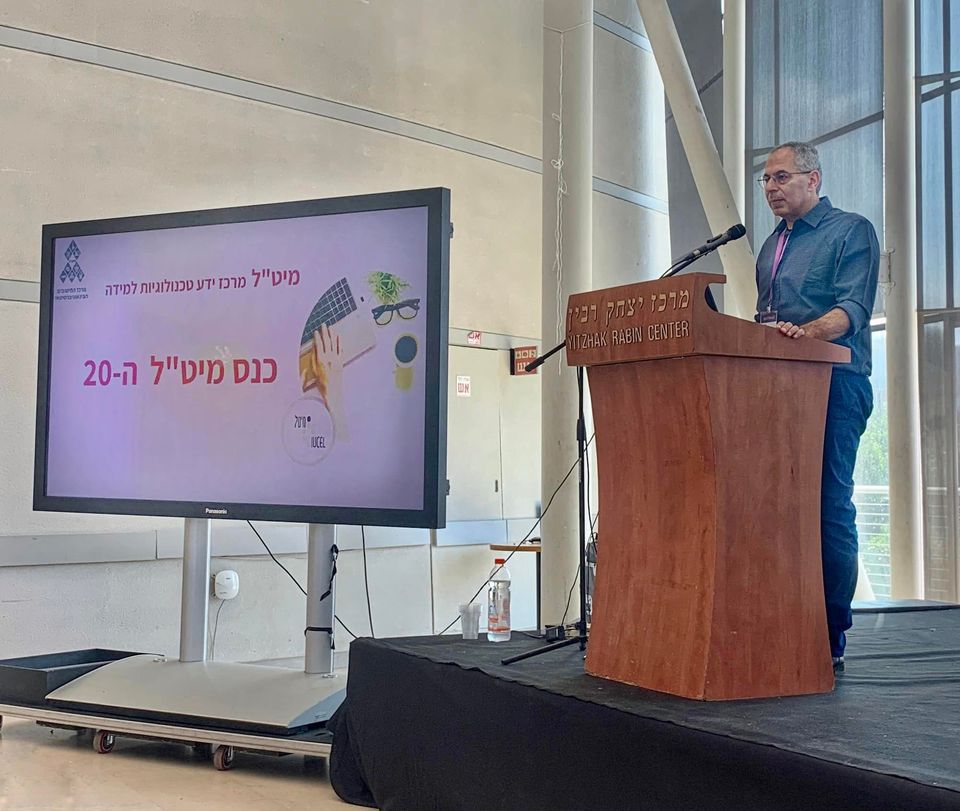
The 20th MEITAL conference was held live this year at the Rabin Center in Tel Aviv on June 29, 2022. Some 300 participants from higher education, the education system, the IDF and industry were in attendance. This year’s conference included three plenary lectures, three sessions on content submitted by applicants, an international track (in English) and a special session in which the student union representatives participated for the first time.
This year’s conference combined a very wide and rich variety of lecturers from Israel and abroad in 15 parallel sessions, over 60 lectures, an international track with guests from a variety of countries from Europe and the US. In addition, several commercial companies presented a variety of learning tools and technologies. On June 30, 2022, there were two workshops on the usefulness of Podcasts and TikTok in teaching.
As part of the joint activities between MEITAL and the Forum for the Advancement of Teaching in higher education, several forum representatives presented at the conference, and contributed significantly to its success.
Representatives of the forum played a significant role in the program committee, presented and participated in the various sessions and added a great deal to the professional and social discourse that took place during the conference.
Opening remarks by Prof. Aharon Palmon, MEITAL Chairperson
“Two years of the Corona pandemic have forced the higher education system, managers, lecturers and students to adopt new teaching and learning habits that dependent on technology. Mainly, distance learning, online teaching, and distance exams to enable uninterrupted functioning of higher education system to continue to train new graduates for the labor market.
This necessity has led to a change in habits. Even now, with the health impact of the pandemic diminishing, the habits and processes acquired over the last two years are still with us. One of the most significant is that realization by students that they can study reasonably well in many courses without being physically present at lectures. Remote broadcasts, recorded and then viewed at convenient times and courses built online for self-study changed the way students learn. This has forced necessary changes in pedagogy in higher education, even though the immediate risk may have passed.
We are currently studying this changed reality, analyzing its meanings, and trying to learn what the new optimal situation is to strive for. The new reality of many students not returning to campuses, and on the other hand, the desire of academic institutions to create a vibrant academic community dependent on human interaction in institutions, is a formidable challenge. As technology and pedagogy people we are required to suggest ways that will help deal with the new situation and better lead teaching and learning for both faculty and students.
In order to better deal with the new situation, we must seek the answers in the combination of pedagogy and technology. We decided to advance and enhance this connection. The Corona pandemic has shown us that the combination of pedagogy and technology creates solutions. We hope that this message is heard at the national level and not just the institutional level.
From the conference lectures
The opening lecture was delivered by Prof. Yoram Eshet from the Open University on “Everyone talks about digital literacy, but what are they doing about it?”
“Just as the traditional concept of ‘literacy’ refers to a person’s ability to use the skill of reading and writing to convey and absorb messages, the concept of ‘digital literacy’ refers to his ability to use digital technologies for these purposes. Emotional and motor skills, the control of which is a critical condition for effective learning, teaching and training.” In his lecture, he presented research that illustrates that while everyone speaks of the importance of teaching digital proficiency, not enough has been done to realize this successfully.
The plenary lecture was given by Mr. Shai Reshef from the University of the People on “The University of the People (UoPeople) – a unique model for higher education.”
The University of the people (UoPeople) is an free online American university that confers recognized degrees. It opens its doors to every high school graduate in the world for whom the doors to academia are closed for any reason.
The closing lecture was delivered by Mr. Svein-Tore Griff, CEO and Founder of H5P on “The H5P OER Hub”
The H5P OER Center will be an open searchable content repository created by and for educators from around the world. It will allow H5P community members to share their work and benefit from the creativity and skills of colleagues everywhere.
The three invited sessions covered “Promoting Teaching: Integrating Teaching and Learning Technologies in Higher Education”, launch of the MEITAL book on Learning Technologies in Higher Education in Israel and “Learning Analytics for Teaching – Challenges and Opportunities in the World of Data”.
The two international sessions were on “Learning Spaces and New Pedagogical Models – Beyond COVID-19” and “Practical Solutions for Strengthening the Social Periphery.”
The special session, “Changing Times – Students’ Perspective ” brought together student representatives, lecturers, institutions, the Council for Higher Education, suppliers to discuss experiences and insights from the last two years, how higher education has changed, and especially what role online learning has played in this.